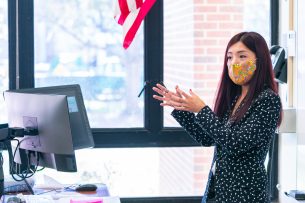For more information, visit the Consortium on Trust in Media and Technology website »

University of Florida College of Journalism and Communications Public Relations Assistant Professor Jay Hmielowski and CJC doctoral students Eve Heffron and Michael Munroe are the co-authors of “You’ve Lost That Trusting Feeling: Diminishing Trust in the News Media in Rural Versus Urban U.S. Communities” published in The Social Science Journal…
Read more
Levels of political polarization continue to escalate in the U.S., causing an increasingly wide chasm between liberals and conservatives. New research explores whether liberal and conservative news outlets contributed to this political divide and increased polarization.
Read more
Dark patterns are design elements that deliberately obscure, mislead, coerce and/or deceive website visitors into making unintended and possibly harmful choices. They take the form of deceptively labeled buttons, choices that are difficult to undo and graphical elements like color and shading that direct users’ attention to or away from certain options.
Read more
One third of the most popular cancer treatment articles on social media contain misinformation. Further, the vast majority of that misinformation has the potential to harm cancer patients by supporting approaches that could negatively impact the quality of their treatment and chances for survival.
Read more
Why do we focus more on the bad than the good? Why do we seek out the more traumatic vs. feel good news stories? Researchers wanted to learn more about the factors that could affect one’s inclination to veer toward negative or positive information, including age, political uses and approaches, and the type of exposure to news.
Read more
When a fictional female journalist appears on screen, chances are she’s about to sleep with one of her sources. It’s a trope that infuriates actual women in news media — and it can have real-life consequences, says University of Florida researcher Frank Waddell, Ph.D.
Read more
The UF Consortium on Trust in Media and Technology has named five UF Trust Consortium Scholars for 2021-2022 who exemplify its commitment to working across disciplines to examine ways trust is being eroded and how it can be restored. The work of these scholars ranges from examining the ways humans…
Read more
Sylvia Chan-Olmsted, University of Florida College of Journalism and Communications Telecommunication professor and Media Consumer Research director, and Janet Coats, managing director of the UF Consortium on Trust in Media and Technology, are quoted in “Can You Spot a Deep Fake? Latest Technology Makes it Harder to Catch” posted on…
Read more
Fake news is on the rise. And it can be profitable. More than 100 fake news websites existed during the 2016 U.S. presidential election, with many sites making $2,500 or more a day from advertising sponsorship. But what is the risk for brands who, intentionally or unknowingly, sponsor content on those sites?
Read more
Building upon her background in corporate communication research, Public Relations Associate Professor Rita Men went into high gear during the pandemic to study effective communications from CEOs as well as chatbots used for social listening.
Read more
Despite the urgency to modernize the nation’s power grid, there has been some public resistance to installing smart meters on people’s homes. Like any topic, misinformation has spread through the public resulting in false perceptions about health, privacy and costs.
Read more
CJC scholars and Centers explore misinformation and vaccine hesitancy, how AI-base recommendation engines can reinforce vaccine misinformation, and strategies to increase the publics’ confidence in COVID-19 vaccines.
Read more